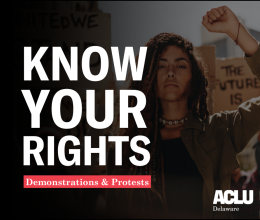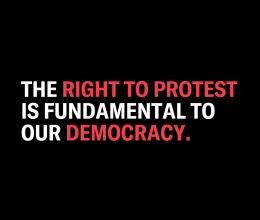UPDATE, 02/07/14: VICTORY! The AG's office withdrew their subpoena, writing that the "information originally sought was no longer necessary" to their investigation.
UPDATE, 01/29/14: The AG's office responded by stating that the subpoena was issued as part of an investigation of a suspected hate crime, but did not offer details about the possible connection. Peaceful Rioters later denied involvement in the suspected hate crime.
UPDATE, 01/28/14: The News Journal wrote an article about our objection. You can read it here.
CONTACT: Kathleen MacRae, Executive Director, 302-654-5326 x102, [email protected] Wilmington, DE
On January 27, 2014, the ACLU of Delaware filed papers with Superior Court to object to the compelling of Facebook to provide the identity of the owner of the Facebook page: Peaceful Rioters for Wilmington, Delaware. We took this action in order to protect the First Amendment of the U.S. Constitution and the free speech rights of all speakers, writers and bloggers in Delaware and America.
The ACLU does not sanction nor endorse the content of the speech published on the Peaceful Rioters for Wilmington, Delaware Facebook page in any way. Since 1920, ACLU has been defending free speech and all other constitutional rights regardless of partisan affiliation or political consideration. This remains our rationale for taking this action today. If all speech was polite, rational and conventional, the ACLU would have no need to defend it. It is the inflammatory, provocative, controversial, and even baseless speech that the First Amendment is intended to protect.
From a legal perspective, our actions are based on the many cases that recognize that the First Amendment protects the right to speak anonymously, over the internet or otherwise. See, for example, the Delaware Supreme Court decision, John Doe No. 1 v. Cahill, 884 A.2d 451 (2005), and United States Supreme Court decisions, Watchtower Bible & Tract Soc’y v. Village of Stratton, 536 U.S. 150, 166-167 (2002); McIntyre v. Ohio Elections Comm., 514 U.S. 334 (1995); Talley v. California, 362 U.S. 60 (1960).
Correction: The original version of this statement misstated that defending free speech etc. "remains our rational [sic] for taking this action today." It is our rationale, not rational. We apologize for any confusion.









